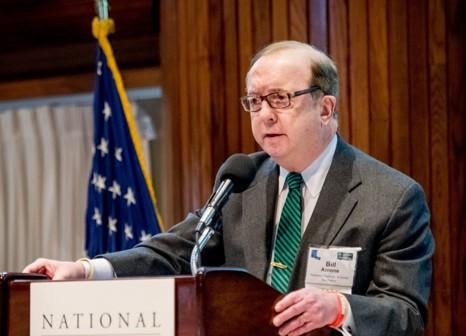

“The idea of Universal Family Care is to create a framework where those pillars of a care infrastructure will be fully funded in a durable way and integrated, unified, and interdependent.”
– Ai-jen Poo, Director National Domestic Workers Alliance
How do we help older workers (those age 55 and over) who face multiple barriers to a secure retirement? In 2019, in collaboration with AARP, the Academy engaged in a year-long effort, the Social Security Policy Innovations Challenge, to identify fresh approaches to address the income adequacy needs of older workers who must claim Social Security retirement benefits early due to ill health, an inability to continue to perform physically demanding jobs, or other factors. Each of the proposals submitted to the Challenge went through a rigorous vetting and review process, as well as further refinement (including leveraging the expertise of the Academy Members). The Challenge yielded a package of four policy ideas that, together, begin to address problems associated with retirement insecurity in complementary ways. The results of the Challenge, which the Academy promoted widely on social media, caught the attention of Senator Sherrod Brown’s office, which is working to develop legislation based on one of the winning ideas.


“Not everyone can work longer either because of their health or because of the nature of their work. We need innovative policy solutions to help these people maintain their financial well-being as the retirement age is rising to 67.”
– Debra Whitman, Chief Public Policy Officer, AARP
 How might national policymakers improve access to affordable, high-quality health coverage and care, and constrain health care spending? The current system of insurance coverage in the U.S. has led to persistent gaps in access to affordable coverage and care—leaving 1 in 10 without coverage and nearly a third of adults under the age of 65 with inadequate coverage that puts them at risk of health and financial insecurity. Additionally, the rising cost of health care puts pressure on individuals and families, employers, and federal and state governments. In response to these challenges, policymakers, academics, and a variety of stakeholders are presenting a wide range of proposals, including proposals to change Medicare eligibility. In 2019, the Academy launched a Medicare Eligibility Study Panel to help policymakers and the public understand potential impacts of expanding Medicare. In March 2020, the Academy’s Study Panel released its final report, which provides an overview of policy design issues and assesses the potential impacts of three approaches to changing Medicare eligibility: lowering the eligibility age; establishing Medicare-for-all; and creating a Medicare buy-in. This project received support from a range of partners and funders, including The Commonwealth Fund, Arnold Ventures, the Buffin Foundation, the AFL-CIO, and the International Brotherhood of Teamsters.
How might national policymakers improve access to affordable, high-quality health coverage and care, and constrain health care spending? The current system of insurance coverage in the U.S. has led to persistent gaps in access to affordable coverage and care—leaving 1 in 10 without coverage and nearly a third of adults under the age of 65 with inadequate coverage that puts them at risk of health and financial insecurity. Additionally, the rising cost of health care puts pressure on individuals and families, employers, and federal and state governments. In response to these challenges, policymakers, academics, and a variety of stakeholders are presenting a wide range of proposals, including proposals to change Medicare eligibility. In 2019, the Academy launched a Medicare Eligibility Study Panel to help policymakers and the public understand potential impacts of expanding Medicare. In March 2020, the Academy’s Study Panel released its final report, which provides an overview of policy design issues and assesses the potential impacts of three approaches to changing Medicare eligibility: lowering the eligibility age; establishing Medicare-for-all; and creating a Medicare buy-in. This project received support from a range of partners and funders, including The Commonwealth Fund, Arnold Ventures, the Buffin Foundation, the AFL-CIO, and the International Brotherhood of Teamsters.

“Many Americans face the risk of losing access to health insurance through job loss, or early retirement for health or family reasons. The pandemic underscores why we need to address this risk. Arnold Ventures is pleased to work with the Academy to help policymakers understand options and trade-offs when it comes to changing Medicare eligibility.”
– Erica Socker, Vice President of Health Care, Arnold Ventures
What were the implications of President Trump’s proposed “payroll tax holiday”? Coinciding with the week of the 85th anniversary of Social Security’s enactment, the Trump Administration moved to permanently alter the role of employee and employer contributions as the primary funding vehicle for our nation’s most successful and popular social insurance program. Upon the issuance of the President’s Executive Order, the Academy immediately embarked on an intensive media campaign to explain the implications of this attempted fundamental change. Our commentaries and messaging received widespread coverage in major news outlets, including the Washington Post, New York Times, and Wall Street Journal, and we were a leading voice in publicly questioning both the feasibility and desirability of the Executive Order and the Administration’s longer-ranging plans. Academy leadership also reached out directly to members of the Trump Administration to explain the ramifications of the executive order. Modifications to the executive order were subsequently issued.


“The idea that we would not fund Social Security this way in the future opens the door to a fundamentally different approach that changes the program from social insurance to something else.”
– William Arnone, CEO, National Academy of Social Insurance
Would you like to learn more about how your organization can work with the Academy to make an impact? Please contact:
William Arnone, Chief Executive Officer
Email: warnone@nasi.org

